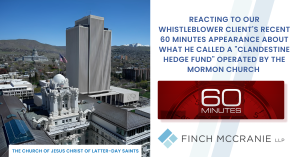The final whistleblower rules of the Commodities Futures Trading Commission (CFTC) are being announced now at a CFTC open meeting. Like the SEC, the CFTC has rejected any provision that whistleblowers be required first to report internally the violations in question, but will treat internal reporting as a “positive” consideration in its awards.
The alternative pushed by business would have required all CFTC whistleblowers first to risk career suicide by reporting the boss’s wrongdoing to the boss himself.
Industry’s approach would have made the Commission the laughing stock of law enforcement, since no rational person with a career and a mortgage would risk reporting even major fraud with that requirement.
Fortunately, the CFTC put first its responsibility to protect the public, and is taking seriously its law enforcement duties by seeking to root out major frauds.
Madoff, Stanford, and the other major frauds of the past decade prove that internal compliance programs cannot protect the public. That is why Congress in Dodd-Frank demanded the first meaningful SEC and CFTC whistleblower programs.
We applaud the CFTC on this important stand, and look forward to reviewing the text of the final rules when made available.
Continue reading →
 Whistleblower Lawyer Blog
Whistleblower Lawyer Blog



